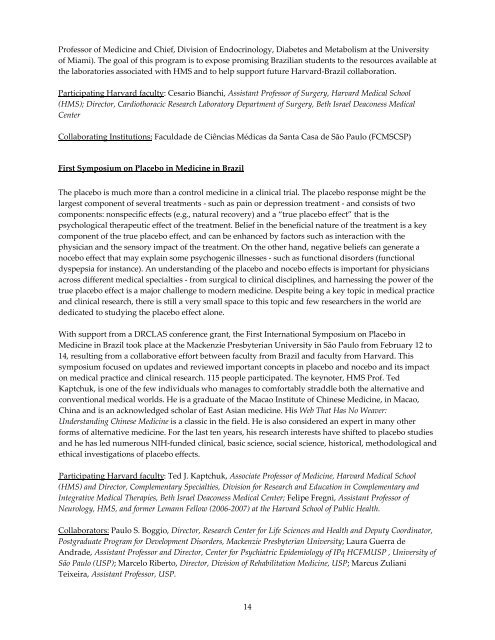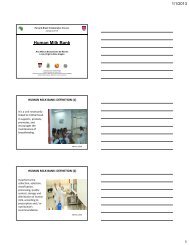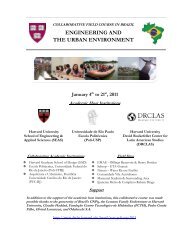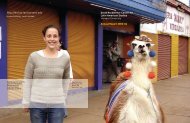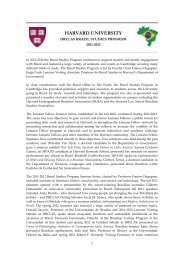Harvard - Brazil Office - DRCLAS - David Rockefeller Center for ...
Harvard - Brazil Office - DRCLAS - David Rockefeller Center for ...
Harvard - Brazil Office - DRCLAS - David Rockefeller Center for ...
Create successful ePaper yourself
Turn your PDF publications into a flip-book with our unique Google optimized e-Paper software.
Professor of Medicine and Chief, Division of Endocrinology, Diabetes and Metabolism at the University<br />
of Miami). The goal of this program is to expose promising <strong>Brazil</strong>ian students to the resources available at<br />
the laboratories associated with HMS and to help support future <strong>Harvard</strong>‐<strong>Brazil</strong> collaboration.<br />
Participating <strong>Harvard</strong> faculty: Cesario Bianchi, Assistant Professor of Surgery, <strong>Harvard</strong> Medical School<br />
(HMS); Director, Cardiothoracic Research Laboratory Department of Surgery, Beth Israel Deaconess Medical<br />
<strong>Center</strong><br />
Collaborating Institutions: Faculdade de Ciências Médicas da Santa Casa de São Paulo (FCMSCSP)<br />
First Symposium on Placebo in Medicine in <strong>Brazil</strong><br />
The placebo is much more than a control medicine in a clinical trial. The placebo response might be the<br />
largest component of several treatments ‐ such as pain or depression treatment ‐ and consists of two<br />
components: nonspecific effects (e.g., natural recovery) and a “true placebo effect” that is the<br />
psychological therapeutic effect of the treatment. Belief in the beneficial nature of the treatment is a key<br />
component of the true placebo effect, and can be enhanced by factors such as interaction with the<br />
physician and the sensory impact of the treatment. On the other hand, negative beliefs can generate a<br />
nocebo effect that may explain some psychogenic illnesses ‐ such as functional disorders (functional<br />
dyspepsia <strong>for</strong> instance). An understanding of the placebo and nocebo effects is important <strong>for</strong> physicians<br />
across different medical specialties ‐ from surgical to clinical disciplines, and harnessing the power of the<br />
true placebo effect is a major challenge to modern medicine. Despite being a key topic in medical practice<br />
and clinical research, there is still a very small space to this topic and few researchers in the world are<br />
dedicated to studying the placebo effect alone.<br />
With support from a <strong>DRCLAS</strong> conference grant, the First International Symposium on Placebo in<br />
Medicine in <strong>Brazil</strong> took place at the Mackenzie Presbyterian University in São Paulo from February 12 to<br />
14, resulting from a collaborative ef<strong>for</strong>t between faculty from <strong>Brazil</strong> and faculty from <strong>Harvard</strong>. This<br />
symposium focused on updates and reviewed important concepts in placebo and nocebo and its impact<br />
on medical practice and clinical research. 115 people participated. The keynoter, HMS Prof. Ted<br />
Kaptchuk, is one of the few individuals who manages to com<strong>for</strong>tably straddle both the alternative and<br />
conventional medical worlds. He is a graduate of the Macao Institute of Chinese Medicine, in Macao,<br />
China and is an acknowledged scholar of East Asian medicine. His Web That Has No Weaver:<br />
Understanding Chinese Medicine is a classic in the field. He is also considered an expert in many other<br />
<strong>for</strong>ms of alternative medicine. For the last ten years, his research interests have shifted to placebo studies<br />
and he has led numerous NIH‐funded clinical, basic science, social science, historical, methodological and<br />
ethical investigations of placebo effects.<br />
Participating <strong>Harvard</strong> faculty: Ted J. Kaptchuk, Associate Professor of Medicine, <strong>Harvard</strong> Medical School<br />
(HMS) and Director, Complementary Specialties, Division <strong>for</strong> Research and Education in Complementary and<br />
Integrative Medical Therapies, Beth Israel Deaconess Medical <strong>Center</strong>; Felipe Fregni, Assistant Professor of<br />
Neurology, HMS, and <strong>for</strong>mer Lemann Fellow (2006‐2007) at the <strong>Harvard</strong> School of Public Health.<br />
Collaborators: Paulo S. Boggio, Director, Research <strong>Center</strong> <strong>for</strong> Life Sciences and Health and Deputy Coordinator,<br />
Postgraduate Program <strong>for</strong> Development Disorders, Mackenzie Presbyterian University; Laura Guerra de<br />
Andrade, Assistant Professor and Director, <strong>Center</strong> <strong>for</strong> Psychiatric Epidemiology of IPq HCFMUSP , University of<br />
São Paulo (USP); Marcelo Riberto, Director, Division of Rehabilitation Medicine, USP; Marcus Zuliani<br />
Teixeira, Assistant Professor, USP.<br />
14


